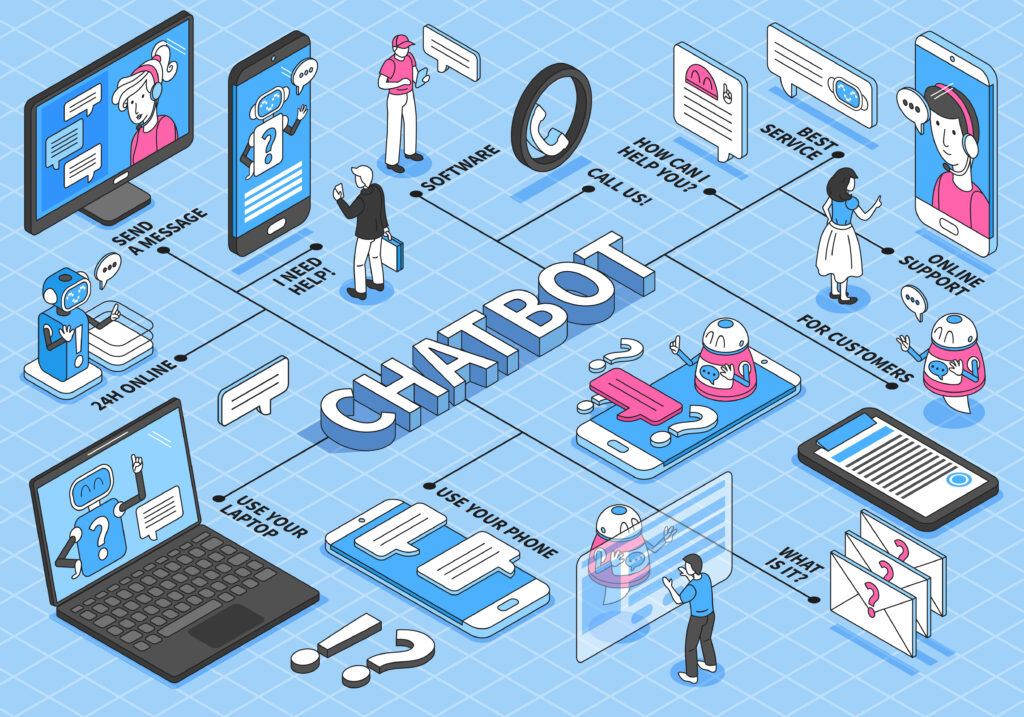
In an increasingly competitive marketplace, businesses are recognizing the vital role that personalized customer experiences play in building loyalty and driving sales. AI chatbots are emerging as powerful tools for achieving this personalization, transforming how companies interact with their customers. Here’s how AI chatbots are enhancing customer experiences:
1. Understanding Customer Preferences
AI chatbots utilize machine learning algorithms to analyze customer data and interactions. By gathering information about customer preferences and behaviors, these chatbots can tailor responses and suggestions to meet individual needs. The more customers interact with the chatbot, the better it understands their preferences, leading to more relevant recommendations. Personalization fosters a sense of connection, encouraging customers to engage more with the brand.
2. Offering Tailored Recommendations
Personalized recommendations are a hallmark of effective customer service. AI chatbots can analyze previous purchases and browsing history to suggest products or services that match customers’ interests. By providing relevant product suggestions, businesses can boost sales and enhance the overall shopping experience. Tailored recommendations improve the likelihood of conversion, as customers feel that their unique needs are being addressed.
3. 24/7 Availability for Immediate Support
AI chatbots provide instant responses to customer inquiries, offering round-the-clock support without the limitations of human agents. Customers can receive assistance at any time, ensuring that their questions are answered promptly, which enhances satisfaction. This constant availability is crucial for businesses that serve a global clientele, catering to international customers across different time zones.
4. Seamless Integration Across Channels
AI chatbots can be integrated into various communication channels, such as websites, social media, and messaging apps. This seamless integration ensures that customers receive consistent support regardless of how they choose to interact with the brand. Customers can switch between channels without losing context, leading to a smoother interaction and higher satisfaction. Maintaining a cohesive brand voice across different platforms reinforces customer trust and loyalty.
5. Learning and Adapting Over Time
AI chatbots are designed to learn from interactions and improve over time. By analyzing past conversations, they can refine their responses and become more effective in meeting customer needs. The chatbot’s ability to learn ensures that it evolves alongside changing customer expectations, enhancing its relevance. Personalized interactions become more sophisticated, leading to a deeper understanding of customer needs.
6. Handling Complex Queries
While AI chatbots excel at managing straightforward inquiries, they can also handle more complex questions by utilizing advanced natural language processing (NLP) techniques. By understanding context and nuance, chatbots can provide accurate responses to complex queries, reducing frustration for customers. If a situation becomes too complicated, the chatbot can seamlessly transfer the customer to a human agent, ensuring a smooth transition.
7. Feedback Collection for Continuous Enhancement
AI chatbots can collect valuable customer feedback during and after interactions, offering insights into customer satisfaction and areas for improvement. This feedback helps businesses identify trends and adjust strategies, improving products and services. Utilizing customer input ensures that enhancements align with actual needs and expectations, fostering innovation and continuous improvement within the organization.
8. Building Trust Through Personalization
Personalized interactions foster trust between businesses and customers. When customers feel understood and valued, they are more likely to return. A personalized approach builds long-term customer loyalty, as individuals are more inclined to support brands that prioritize their needs. Satisfied customers become advocates for the brand, spreading positive word-of-mouth and attracting new clients.
Conclusion
AI chatbots are revolutionizing customer interactions by providing personalized experiences that meet the diverse needs of today’s consumers. By leveraging data, offering tailored recommendations, and continuously adapting to customer feedback, businesses can enhance satisfaction and loyalty. As AI technology continues to evolve, the potential for personalization in customer service will only grow, making AI chatbots an indispensable tool for modern businesses.
Summary of Key Points
• Understanding Customer Preferences: AI chatbots analyze data to tailor responses.
• Offering Tailored Recommendations: Personalized suggestions boost sales opportunities.
• 24/7 Availability for Immediate Support: Instant assistance enhances customer satisfaction.
• Seamless Integration Across Channels: Consistent support across various platforms.
• Learning and Adapting Over Time: Chatbots improve through interaction analysis.
• Handling Complex Queries: Advanced NLP techniques resolve intricate questions.
• Feedback Collection for Continuous Enhancement: Customer input drives improvements.
• Building Trust Through Personalization: Personalization fosters loyalty and advocacy.


